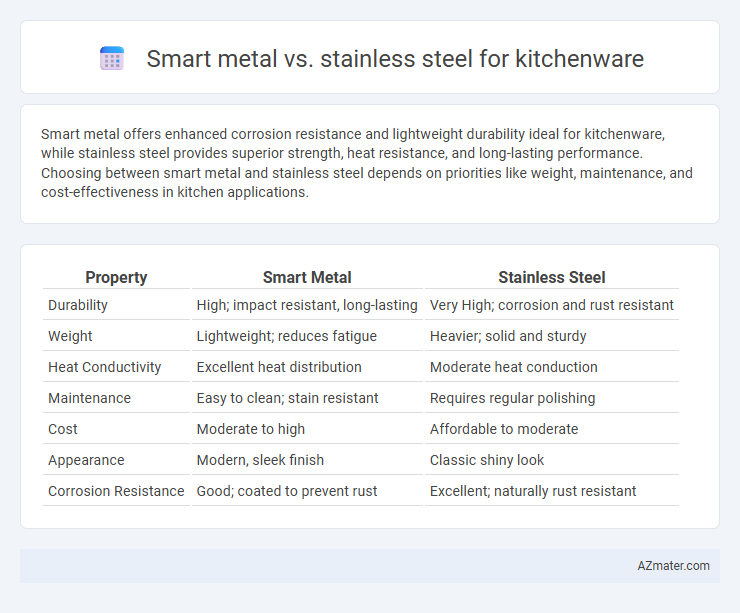Smart metal offers enhanced corrosion resistance and lightweight durability ideal for kitchenware, while stainless steel provides superior strength, heat resistance, and long-lasting performance. Choosing between smart metal and stainless steel depends on priorities like weight, maintenance, and cost-effectiveness in kitchen applications.
Table of Comparison
| Property | Smart Metal | Stainless Steel |
|---|---|---|
| Durability | High; impact resistant, long-lasting | Very High; corrosion and rust resistant |
| Weight | Lightweight; reduces fatigue | Heavier; solid and sturdy |
| Heat Conductivity | Excellent heat distribution | Moderate heat conduction |
| Maintenance | Easy to clean; stain resistant | Requires regular polishing |
| Cost | Moderate to high | Affordable to moderate |
| Appearance | Modern, sleek finish | Classic shiny look |
| Corrosion Resistance | Good; coated to prevent rust | Excellent; naturally rust resistant |
Introduction to Smart Metal and Stainless Steel Kitchenware
Smart metal kitchenware utilizes advanced alloys designed for superior heat distribution, corrosion resistance, and enhanced durability compared to traditional materials. Stainless steel kitchenware, composed primarily of iron, chromium, and nickel, offers excellent resistance to rust, high strength, and is widely valued for its hygienic properties. Both materials cater to modern cooking needs, but smart metal often integrates nanotechnology or specialized coatings to improve non-stick performance and longevity.
Composition and Material Science
Smart metal kitchenware often incorporates advanced alloys with enhanced corrosion resistance and durability due to added elements such as titanium, aluminum, or copper alloys, improving thermal conductivity and mechanical strength. Stainless steel, primarily composed of iron, chromium (typically 10.5% or more), and nickel, offers exceptional corrosion resistance, strength, and hygienic properties because of its passive chromium oxide layer. Material science innovations in smart metals aim to optimize atomic structure and alloy composition for better heat distribution, lightweight design, and long-lasting performance compared to traditional stainless steel variants.
Durability and Longevity Comparison
Smart metal kitchenware offers enhanced durability through advanced alloy compositions that resist corrosion, scratches, and wear better than traditional stainless steel. Stainless steel remains a popular choice due to its proven longevity and resistance to rust, but it can be prone to surface damage and staining over time in high-use environments. Smart metal products typically extend the lifespan of kitchen tools by maintaining structural integrity and aesthetic appeal even under rigorous daily use.
Resistance to Corrosion and Staining
Smart metal kitchenware typically features advanced coatings or alloy compositions that enhance resistance to corrosion and staining beyond traditional stainless steel. Stainless steel, especially grades like 304 or 316, offers reliable corrosion resistance due to its chromium content but may still show stains or rust over time in harsh conditions. Smart metal options are engineered to maintain durability and appearance longer in corrosive kitchen environments, making them ideal for high-moisture or acidic food preparation.
Heat Conductivity and Cooking Performance
Smart metal alloys used in kitchenware often feature superior heat conductivity compared to traditional stainless steel, enabling faster and more even cooking by distributing heat efficiently across the cooking surface. Stainless steel, while durable and resistant to corrosion, tends to have lower thermal conductivity, potentially causing hotspots and uneven cooking performance if not combined with copper or aluminum cores. Smart metals enhance cooking precision and energy efficiency, making them ideal for tasks requiring consistent temperature control.
Maintenance and Cleaning Requirements
Smart metal kitchenware offers superior resistance to stains and corrosion, requiring less frequent polishing and easier stain removal compared to stainless steel. Stainless steel demands regular cleaning with non-abrasive agents to maintain its shine and prevent water spots or rust, especially in high-humidity environments. Both materials benefit from hand washing over dishwashing machines to extend their lifespan, but smart metal's enhanced surface technology significantly reduces maintenance time and effort.
Health and Safety Considerations
Smart metal kitchenware often incorporates antimicrobial coatings that inhibit bacterial growth, offering enhanced health benefits over traditional stainless steel. Stainless steel remains highly durable and non-reactive, ensuring no harmful leaching into food during cooking. Both materials excel in safety, but smart metal's advanced properties provide an extra layer of protection against contamination.
Environmental Impact and Sustainability
Smart metal kitchenware often incorporates advanced alloys and coatings designed for durability and recyclability, reducing environmental waste compared to traditional materials. Stainless steel, prized for its corrosion resistance and longevity, offers high recyclability but demands significant energy during production, impacting its carbon footprint. Choosing smart metals with lower energy manufacturing processes and enhanced lifecycle sustainability supports eco-friendly kitchen solutions.
Cost-Efficiency and Value for Money
Smart metal kitchenware often offers superior cost-efficiency compared to stainless steel due to its enhanced durability and resistance to wear, reducing the need for frequent replacements. While stainless steel remains popular for its classic appearance and corrosion resistance, smart metals typically provide better heat conductivity, improving cooking performance and energy savings. Investing in smart metal kitchenware delivers greater value for money through longer lifespan and improved functionality without significantly higher upfront costs.
Choosing the Best Kitchenware Material for Your Needs
Smart metal kitchenware offers enhanced durability and corrosion resistance through advanced alloys and coatings, making it ideal for high-performance cooking environments. Stainless steel is renowned for its rust resistance, non-reactive properties, and ease of maintenance, suitable for everyday use and various culinary tasks. Selecting between smart metal and stainless steel depends on factors like cooking style, budget, and desired longevity, ensuring optimal functionality and kitchen efficiency.

Infographic: Smart metal vs Stainless steel for Kitchenware
 azmater.com
azmater.com